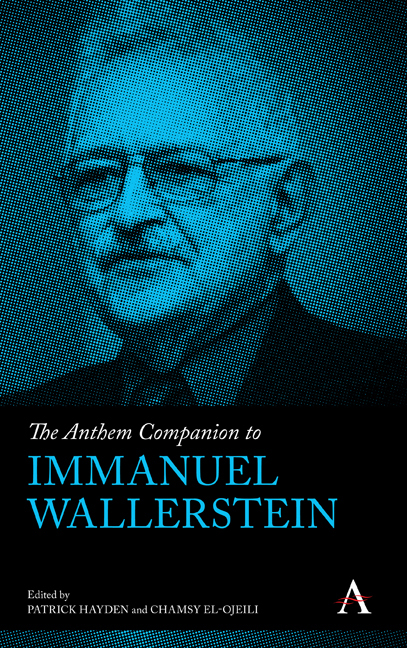Book contents
- Frontmatter
- Contents
- Notes on Contributors
- Acknowledgments
- Chapter 1 “There Is No Such Thing as Sociology”: Wallerstein as Sociologist
- Chapter 2 From Africa to the World: The Sources of Wallerstein’s The Modern World-System
- Chapter 3 Immanuel Wallerstein, World-Systems Analysis and the Structures of Knowledge
- Chapter 4 Wallerstein as International Political Sociologist: On Power, Hegemony and the Interstate System
- Chapter 5 The Agonies of Liberalism: Wallerstein on the Rise and Fall of Liberal Ideology
- Chapter 6 Global Inequalities Avant la Lettre: Theoretical Filiations and Radical Critique
- Chapter 7 Reckoning with Gender in the World-System: Insights from and Challenges to Wallerstein
- Chapter 8 The Past and Future of Antisystemic Movements: Possibilities and Limits of Social Change in Wallerstein’s World-Systems Analysis
- Chapter 9 The Global Environment and Climate Change inthe Modern World-System
- Chapter 10 Pervasive Pandemics: Understanding Global Healthand Disease from a World-Systems Perspective
- Index
Chapter 7 - Reckoning with Gender in the World-System: Insights from and Challenges to Wallerstein
Published online by Cambridge University Press: 29 February 2024
- Frontmatter
- Contents
- Notes on Contributors
- Acknowledgments
- Chapter 1 “There Is No Such Thing as Sociology”: Wallerstein as Sociologist
- Chapter 2 From Africa to the World: The Sources of Wallerstein’s The Modern World-System
- Chapter 3 Immanuel Wallerstein, World-Systems Analysis and the Structures of Knowledge
- Chapter 4 Wallerstein as International Political Sociologist: On Power, Hegemony and the Interstate System
- Chapter 5 The Agonies of Liberalism: Wallerstein on the Rise and Fall of Liberal Ideology
- Chapter 6 Global Inequalities Avant la Lettre: Theoretical Filiations and Radical Critique
- Chapter 7 Reckoning with Gender in the World-System: Insights from and Challenges to Wallerstein
- Chapter 8 The Past and Future of Antisystemic Movements: Possibilities and Limits of Social Change in Wallerstein’s World-Systems Analysis
- Chapter 9 The Global Environment and Climate Change inthe Modern World-System
- Chapter 10 Pervasive Pandemics: Understanding Global Healthand Disease from a World-Systems Perspective
- Index
Summary
For more than a half-century, Immanuel Wallerstein's creative and prescient thinking has been central to debates focused on how best to understand historical capitalism and large-scale, long-term change. This includes understanding people's place in the world as members of households, citizens of national formations, participants in the global community and agents of change. Wallerstein's contributions have been central, as well, to critiques of disciplinary knowledge, with emphasis on the limits of nineteenth-century paradigms. Yet, his consideration of gender within world-systems research has shown little explicit recognition of feminist analyses of gender, even as both world-systems and feminist inquiry share theoretical and methodological commitments and interests. In this chapter, I focus on two areas that characterize Wallerstein's rich corpus of intellectual engagement. The first is his understanding of historical capitalism and, in collaboration with Terence Hopkins, his elaboration of how world-systems approaches conceive of and engage women and gender relations. Second, if more briefly, I examine Wallerstein's (1977, 3) long-term preoccupation with and questioning of the foundational “presuppositions of the various social sciences as they emerged from the nineteenth-century Western world” to highlight the intersections, parallels and contestations between Wallerstein's epistemological arguments and those, broadly defined, within feminist inquiry.
Attentive to each of Wallerstein's major contributions, I begin by identifying how world-systems scholars examine women and gender relations at the intersections of national and transnational contexts to show where a feminist episteme both intersects with, and can further refine, relations between these traditions. In so doing, I draw attention to possible synergies and divergences between feminist inquiry and the Wallersteinian oeuvre. I conclude this section by showing, first, how Wallerstein's provocative framing influenced a rich literature on women in the world-economy, even as much of this literature fails to acknowledge Wallerstein's role in the emergent debates and discourses at the time or to engage the epistemic bases of world-systems analyses. Finally, in the last section of this chapter, I highlight Wallerstein's critical reading of the disciplines to suggest that far too little attention has been given to the shared and divergent intellectual commitments and critiques by feminist scholars. I conclude with a focus on the differences between the epistemic claims of world-systems and feminist analysts to stress the critical importance of showing that women not only respond to historical changes in world-systemic relations, but they also constitute their formation.
- Type
- Chapter
- Information
- The Anthem Companion to Immanuel Wallerstein , pp. 121 - 144Publisher: Anthem PressPrint publication year: 2023



